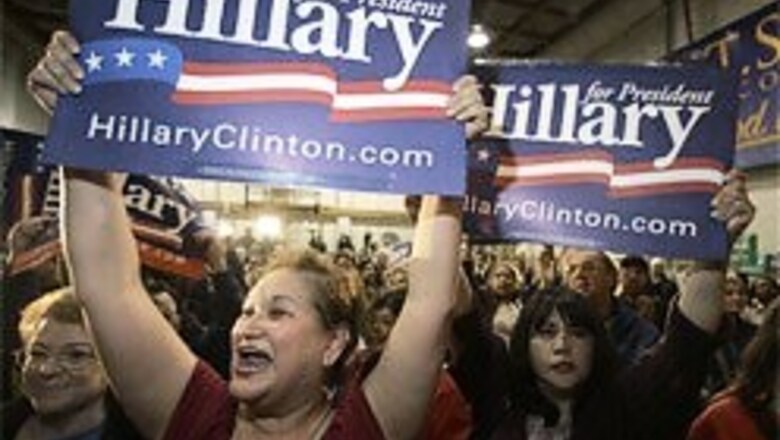
views
Washington: Hillary Rodham Clinton and Barack Obama dug in for a extended battle for the Demoractic presidential nomination after splitting wins in the biggest primary day in US history.
Republican John McCain all but wrapped up his party's nomination, winning the most important primaries and building what could be an insurmountable lead in delegates.
Hillary won California and New York, the most populous of the 22-states that held contests on Super Tuesday, and maintains a lead in the all-important tally of delegates.
But Obama is close behind and, with wins in at least 13 states, has fresh momentum as the Democratic race moves into territory where he would seem to have an edge.
Either Hillary or Obama will likely face a formidable opponent in John McCain, whose cross-country victories on Tuesday seem to guarantee he will be the Republican candidate in the November presidential election.
McCain's independent streak has won him support across party lines and, more than most Republicans, allows him to distance himself from the unpopular presidency of George W Bush.
McCain's victories in California, New York and other major states dealt a crushing blow to his main rival, former Massachusetts governor Mitt Romney, and capped a remarkable comeback for a campaign that nearly unraveled last year.
"We've won some of the biggest states in the country," McCain told cheering supporters at a rally in Phoenix.
An underdog for months, he proclaimed himself the front-runner at last, and added. "I don't really mind it one bit."
In the competition that counted the most, the Arizona senator had 613 delegates, more than half the 1,191 needed for the nomination - and far ahead of his rivals.
Even so, Romney and Mike Huckabee, a former Arkansas governor, said they were staying in the race.
Huckabee, a Baptist preacher, won contests in the south, his appeal to Christians conservatives there undermining Romney's support.
Hillary had 845 delegates, to 765 for Obama, out of the 2,025 needed to secure victory at the party convention in August.
Clinton's advantage is partly due to her lead among so-called superdelegates, members of Congress and other party leaders who are not selected in primaries and caucuses - and who are also free to change their minds.
PAGE_BREAK
She won a total of eight states plus American Samoa.
Neither Hillary nor Obama proclaimed victory.
"I look forward to continuing our campaign and our debate about how to leave this country better off for the next generation," Hillary told supporters in New York.
Obama was in Chicago, where he told a noisy election night rally, "Our time has come. Our movement is real. And change is coming to America."
Missouri was so close that although Obama won the vote count it was likely to be hours before it became clear whether he or his rival had captured a majority of the state's 72 delegates.
The Democratic caucuses in New Mexico remained unsettled.
Hillary had a 117-vote lead when the party shut down its vote counting operation until 11 AM EST (1600 GMT).
Super Tuesday marked a shift in the monthslong campaign to select US presidential nominees.
While early contests helped candidates build momentum, Tuesday's votes were about winning the delegates who will select the nominees.
Democrats had 1,681 delegates at stake; Republicans had 1,023 delegates.
The allocation of delegates lagged the vote count by hours.
That was particularly true for the Democrats, who divided theirs roughly in proportion to the popular vote in each state.
Hillary had long been the front-runner in the Democratic race.
Her campaign has emphasised her experience as a senator and first lady.
She would be the country's first female president. Obama, a first-term senator who is vying to become the first black president, has offered a spirited challenge, carrying a message of change and hope after years of political gridlock in Washington.
Already, the campaigns were looking ahead to contests Saturday in Louisiana, Nebraska and Washington state and February 12 primaries in Maryland, Virginia and Washington, DC.
PAGE_BREAK
Overall, Hillary was winning only a slight edge among women and white voters, both groups that she has won handily in earlier contests, according to preliminary results from interviews with voters in 16 states leaving polling places.
Obama was collecting the overwhelming majority of votes cast by blacks, and Hillary was gaining the votes of roughly six in 10 Hispanics.
Democrats and Republicans alike said the economy was their most important issue, according to preliminary results from election day interviews with voters leaving polling places.
Democrats said the war in Iraq ranked second and health care third.
Republican primary voters said immigration was second most important after the economy, followed by the war in Iraq.
The survey was conducted in 16 states by Edison Media Research and Mitofsky International for The Associated Press and television networks.
McCain, a veteran senator and former Vietnam prisoner of war, has campaigned on his national security experience.
His reputation as a maverick has won him support from independent voters and moderate Republicans but alienated conservative Republicans who form the party's core constituency.
He has benefited from the failed campaigns of other rivals, including former New York City Mayor Rudy Giuliani and actor and former senator Fred Thompson.
Romney won in Massachusetts, where he had served as governor, and Utah, where fellow Mormons supported his candidacy.
He also won in North Dakota, Minnesota, Colorado, Alaska and Montana.
Mike Huckabee, a Baptist preacher and another former Arkansas governor, had a surprisingly strong performance, using his support among southern Christians to win in Georgia, Alabama, West Virginia, Tennessee and his home state.
These were the first wins for Huckabee since he stunned the political establishment by winning the Iowa caucuses, the first major contest of the campaign.
Neither Romney nor Huckabee appeared able to overtake McCain, but both vowed to stay in the race. "We're going to win this thing," Romney told supporters in Boston.
McCain would be a formidable rival for either Clinton or Obama at a time Democrats hope Americans' dissatisfaction with Bush, a Republican, will help them win the White House.
If he should win the presidency, McCain, 71, would be the United States' oldest first-term president when inaugurated.




















Comments
0 comment